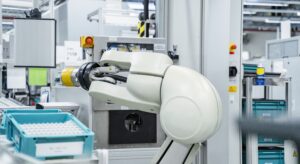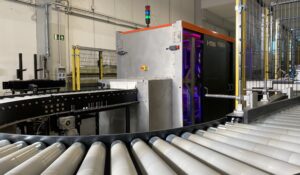Natural Branding: laser marking that eliminates waste and revolutionizes labeling. The need to reduce waste and move towards more sustainable consumption patterns has led to the emergence of innovative solutions in different sectors. One of the most striking in the agri-food sector is direct laser marking on fruits and vegetables, also known as Natural Branding. This technology eliminates the need for adhesive labels, ink or plastic packaging, allowing the necessary information for identification, traceability or promotion to be engraved directly on the skin of the product.
In a context where sustainability is a market requirement and not an option, laser marking is positioned as a powerful tool for retailers, producers and distributors committed to the circular economy.
At I-MAS, where we understand the importance of applied innovation, this technology seems to us to be an excellent example of how technical development can respond to real environmental challenges.
How does laser marking on food work?
The technology, known as Natural Branding, uses a carbon dioxide laser (CO₂) to remove a thin layer of surface pigment from the skin of the food, generating a visible mark that can contain data such as the name of the product, its origin, PLU code or even logos. All this without damaging the pulp, nor altering the flavor, texture or shelf life of the product.
In some cases, a thin layer of approved substances, such as iron oxides (E 172) or hydroxypropyl methyl cellulose (E 464), can be applied to improve contrast, always in compliance with Regulation (EU) 510/2013 regulating additives in food.
It is a non-invasive, non-contact process that does not require consumables, which reduces costs and operational complexity compared to traditional labeling systems.
Environmental and operational benefits of laser marking
The application of this technology generates tangible benefits in several dimensions:
- Waste elimination: every sticker avoided is one less piece of plastic and paper that ends up in the garbage can. Supermarkets such as ICA in Sweden or Eosta in the Netherlands estimate a reduction of millions of labels per year on organic products such as avocados, sweet potatoes or kiwis alone.
- Reduced carbon emissions: by dispensing with the manufacture, transport and application of adhesive labels, energy impact is minimized. The laser system, although requiring an initial investment, has a low and constant energy consumption.
- Traceability and hygiene: marks are permanent and non-removable, which facilitates logistical control and reduces handling. In addition, by avoiding adhesives and inks, potential contaminants are avoided.
- Economic savings in the medium term: although laser marking systems have a high initial cost, the elimination of consumables (labels, ink, glue) and the lower maintenance quickly compensate the investment.
Market acceptance and real cases
Although this is a recent technology, there are already real examples of its implementation in European supermarkets. Chains such as ICA (Sweden), Carrefour (France) or Tesco (UK) have carried out pilot tests or direct applications of this technology. According to recent studies, consumer acceptance is high, especially when the environmental benefit is clearly communicated.
In Spain, companies such as Laser Food are leading the research and development of systems adaptable to different types of fruit, with speeds and accuracies adjustable according to the product. Laser Food is also a technological partner of I-MAS, with whom we have collaborated in the development and manufacture of a laser labeling machine specially designed to be integrated into food production lines. This collaboration demonstrates how joint innovation between engineering and applied technology can lead to real and sustainable solutions.
The role of I-MAS in the transformation of the sector
At I-MAS, we believe that this type of technology represents a clear example of how engineering can respond to the great challenges of the food industry: sustainability, efficiency and digitalization.
The challenge now is to improve marking speed, adapt the equipment to new fruit varieties and expand its use to other sectors such as bakery, natural cosmetics or biodegradable packaging.
The future of labeling may not be on a label, but on the skin of the product itself. del producto. Y el láser puede ser el instrumento que nos lo recuerde.
In the engineering department of i-mas we are specialized in the combination of artificial vision technologies, deep learning and industrial automation in production processes, which allows us to offer integral solutions adapted to the specific needs of each client.
Want to learn more about our services? Contact us or visit our projects section!



